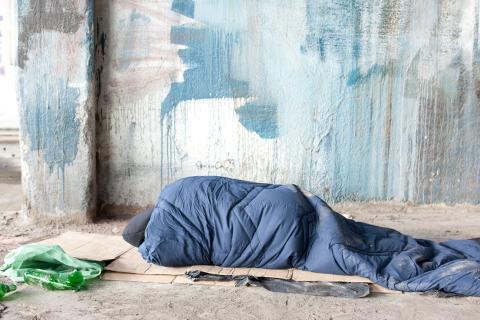European Economic
and Social Committee
EESC demands political efforts be stepped up to eradicate homelessness
Almost 900 000 people experience street homelessness or stay in a shelter on any given night in the EU. With homelessness rising rapidly, the EESC calls upon Member States and the EU to take concrete action
The European Economic and Social Committee (EESC) is calling for a comprehensive EU homelessness strategy and for effective national homelessness policies to be swiftly put in place in a bid to substantially reduce this worsening phenomenon – which represents one of the most extreme forms of social exclusion – by 2030.
"We call for an EU homelessness strategy that fully integrates the European Platform on Combating Homelessness (EPOCH) and allows national homelessness policies to be included in the European Semester," said rapporteur of the EESC opinion EU framework for national homeless strategies
Maria del Carmen Barrera Chamorro.
This strategy must be supported by a Council Recommendation and we call on the incoming Belgian EU Presidency to start working on it,
she stressed.
Another request was for the Commission to swiftly draw up a proposal for a new multi-annual work programme which would continue into and cover its entire next mandate. The fight against homelessness should be integrated into all relevant EU actions and strategies in a cross-cutting manner.
The EESC wants homelessness to remain a social policy priority for the EU in the run-up to the European elections and beyond. We need a strategic shift in focus from managing homelessness to actually ending it by 2030,
stated co-rapporteur of the opinion, Ákos Topolánszky.
In the opinion adopted at its plenary session in December, the EESC suggested actively promoting the Housing First
principle to address chronic homelessness.
Since most countries are still managing homelessness with emergency responses through the shelter system rather than seeking to prevent and end homelessness by providing housing, the EESC proposed that national authorities undergo training programmes to boost the uptake of this housing-led approach, which is proving to be most effective in tackling and preventing homelessness.
According to Housing First
, housing is not just a shelter but a tool for reintegration. It provides long-term housing solutions and is not dependant on conditions such as the need to demonstrate personal development or to accept support.
To ensure a dignified life for the homeless, it is also necessary to put in place social protection policies such as active employment policies and minimum income schemes, so that homeless people can get back on track with their lives, Ms Barrera Chamorro said.
The housing-led approach was already agreed upon in the Lisbon Declaration, which was signed by all 27 EU Member States, the Commission, the European Parliament, the EESC, the Committee of the Regions, several European NGOs and a number of other stakeholders in June 2021.
The Declaration is the political basis for EPOCH, which was launched in 2021 by Portugal, which at the time was at the helm of the Council of the EU. It had the support of the European Commission.
The Lisbon Declaration signatories undertook to cooperate on homelessness at EU level and to work towards ending homelessness by 2030.
However, despite political efforts, not enough is being done to address homelessness at either European or national level, the EESC noted in the opinion. There is no truly global approach and no comprehensive strategic solutions – and this means that homelessness is continuing and in fact getting worse, driven by the cost-of-living crisis.
The EESC is therefore urging Member States to live up to their commitment and make substantial progress towards substantially diminishing homelessness by 2030, and then eradicating it within a defined time period, by setting ambitious and achievable milestones. It is calling on countries to implement national homelessness policies and integrate the Housing First approach into their strategies based on the Lisbon Declaration.
The EESC noted that the human rights approach to homelessness remained underdeveloped in most countries. These practices should therefore be critically evaluated from the point of view of fundamental rights and, in the event of violations such as criminalisation of homelessness, Member States should be called on to change their practices.
Over the last 15 years, homelessness has more than doubled in most Member States and in the EU as a whole. Estimates show that at least 895 000 people experience street homelessness or stay in a homeless shelter on any given night in the EU, and several million people experience homelessness each year, including less visible forms such as couch surfing.
Over the last 20 years, Finland is the only country that has managed to reduce homelessness consistently. Denmark and Austria seem to have reversed the rising trend of homelessness.
The majority of homeless people are male and middle aged, but women, young people, families and children are also affected. In a worrying trend, there is a growing number of migrants and those from minority ethnic backgrounds among the homeless population. There are also certain groups among this population which deserve specific attention, such as LGBTIQ people, people living with disabilities and the ageing homeless.
